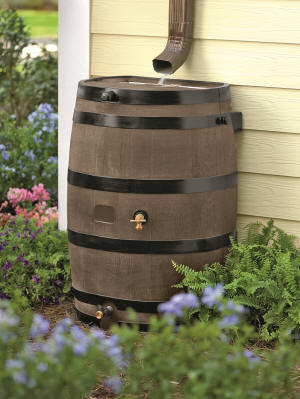|
 Save
Money and Water While Still Enjoying a Beautiful Garden Save
Money and Water While Still Enjoying a Beautiful Garden
By Melinda Myers
 Send a link to a friend
Send a link to a friend
[July 30, 2016]
Too
much or not enough water and never when you need it seems to be a
common lament of gardeners. Reduce the impact of these weather
challenges while conserving water, saving money on water and sewer
bills, and growing beautiful gardens with the help of rain barrels.
These century old devices are making a comeback as droughts,
watering restrictions and storm water runoff are on the rise. |
|
 Contact your local municipality before getting started. Some
communities have regulations and guidelines for using rain barrels
and many offer rebates to homeowners who install them. Contact your local municipality before getting started. Some
communities have regulations and guidelines for using rain barrels
and many offer rebates to homeowners who install them.
Start your conversion to rain barrels one downspout at a time. You
can capture as much as 623 gallons of water from 1,000 square feet
of roof in a one-inch rainfall. This can be a lot to manage when
first adapting to this change of habit. Taking little steps allows
you to successfully match the use of rain barrels to your gardening
style and schedule.
Make your own or purchase one of the many rain barrels on the
market. Regardless of which vessel you choose there are some
features to consider when adding a rain barrel to your landscape.
Make sure the top is covered to keep out debris and mosquitoes. Or
select one with a solid lid and opening just large enough to
accommodate the downspout.
 Look for one with a spigot low on the barrel, so water does not
stagnate at the bottom. Use the spigot to fill watering cans or
attach a hose. Elevate the barrel on cinder blocks or a decorative
stand for easier access and to increase water pressure.
Make sure there is an overflow outlet to direct excess water away
from your home’s foundation. Or use it to link several barrels
together, increasing your water collecting capacity. A downspout
diverter is another way to manage rain barrel overflows. When the
rain barrels are full this device diverts the water back to the
downspout where it is carried away from your home’s foundation.
And the good news is you don’t need to overlook beauty for function.
You’ll find many attractive options in a variety of shapes and sizes
in garden centers and online catalogs such as Gardener’s Supply (gardeners.com).
Some include a recessed top for storing accessories or growing a
potted plant. You’ll find ones with decorative finishes that mimic a
basketweave, fine terra cotta or wood. Those with a flat backside
like the Madison rain barrel fit right next to the house, saving
space.
Rain water is naturally softened and free of flouride and chlorine;
great for plants. Do not use rain barrel water for drinking, cooking
or your pets. Avoid concerns of contamination from roofing materials
and debris by only using the water for ornamental plants. [to top of second
column] |

Maintenance is easy. Check for and remove twigs and debris that may collect and
block the flow of water. Clean the inside of the barrel at least once a year
with an environmentally friendly detergent. Those in cold climates need to drain
the rain barrel and cover the opening or turn it upside down for winter storage.
Make sure to divert the water away from the house once the downspout is
disconnected.
Don’t worry about mosquitoes. Covering the opening with a fine screen and using
the water on a regular basis will minimize the risk. Or use the eco-friendly
bacterial agent Bacillus thuringiensis israelensis (Bti) that kills mosquito
larvae, but is safe for pets, people and wildlife.
Now is the time to start putting rainwater to work for you and your garden. Look
for convenient locations for collecting and using rainwater from the roof of
your home, shed or garage. A little effort put in now will result in benefits
for years to come.
[Photo credit: Gardener’s Supply
Company] Melinda Myers
has more than 30 years of horticulture experience and has written
over 20 gardening books, including Small Space Gardening and the
Midwest Gardener’s Handbook. She hosts The Great Courses “How to
Grow Anything: Food Gardening For Everyone” DVD set and the
nationally syndicated Melinda’s Garden Moment TV & radio segments.
Myers is a columnist and contributing editor for Birds & Blooms
magazine and was commissioned by Gardener’s Supply Company for her
expertise to write this article. Myers’ web site is
www.melindamyers.com.


|